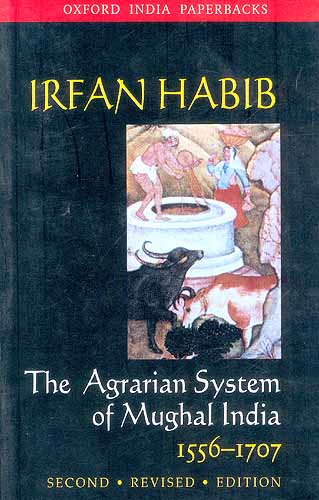
Irfan Habib (Urdu: عرفان حبیب, Gujarati: ઈરફાન હબીબ; born 1931) is an Indian Marxist historian, a former Chairman of the Indian Council of Historical Research and a Padma Bhushan awardee. He is a Professor Emeritus at Aligarh Muslim University. He has served in the Indian History Congress for many years. Irfan Habib and R.S. Sharma have been historians of international repute even before the Indian Council of Historical Research was set up.


Biography
Habib is the son of Mohammad Habib, the eminent historian and independence activist. His paternal grandfather was Mohammad Naseem, a wealthy barrister, and nationalist, who funded the Lucknow Session of the Indian National Congress in 1916. His mother Sohaila Habib (née Tyabji) was the daughter of Abbas Tyabji, a close associate of Mahatma Gandhi, who became the Chief Justice of the High Court of Baroda. His wife Sayera Habib (née Siddiqui) taught as Professor of Economics at Aligarh Muslim University. His second son Faiz Habib is Cartographic Assistant in Archaeological Section of Center of Advanced Study.





Education and Work
He was Professor of History at Aligarh from 1969–91, as well as Co-ordinator/Chairman of the Centre of Advanced Study in History, AMU, during 1975-77 and 1984-94. Prof.Habib is presently appointed as Professor Emeritus at the Department of History, Aligarh Muslim University. Habib has worked on the historical geography of Ancient India, the history of Indian technology, medieval administrative and economic history, colonialism and its impact on India, and historiography.
Amiya Kumar Bagchi describes Habib as "one of the two most prominent Marxist historians of India today and at the same time, one of the greatest living historians of India between the twelfth and eighteenth centuries."
Professor Sumit Sarkar says:"Indian Historiography, starting with D.D. Kosambi in the 1950s, is acknowledged the world over - wherever South Asian history is taught or studied - as quite on a par with or even superior to all that is produced abroad. And that is why Irfan Habib or Romila Thapar or R.S. Sharma are figures respected even in the most diehard anti-Communist American universities. They cannot be ignored if you are studying South Asian history."


Positions held
He was Chairman of the Indian Council of Historical Research during 1987-93. He was also the President, Indian History Congress, 1981. In 1991 he was invited to deliver the Radhakrishnan Lecturer at Oxford. He is an Elected Corresponding Fellow, British Royal Historical Society since 1997.Spat with BJP government
Irfan Habib was among the historians who opposed the rewriting of history by the BJP led NDA government. He criticised the Human Resources Development Minister Murli Manohar Joshi for making "absurd statements" regarding the Sanskrit language and accused the Union government of trying to "invent" history . He was among the historians at the Indian History Congress in 1998 when they moved a resolution against the saffronisation of history . To counter Irfan Habib, Murli Manohar Joshi had released a book to rebuts the history of ‘‘Habib & Co’’ .Philosophical and political views
Habib identifies himself as a Marxist and uses Marxist historiography in his work.Honours
- Among the first six Jawaharlal Nehru Fellows, 1968.
- Watumull Prize of American Historical Association, 1982. (Jointly with Tapan Raychaudhuri)
- Padma Bhushan, 2005.
- Muzaffar Ahmad Memorial Prize, 2006.
- Degree of Doctor of Letters, Honoris Causa, from Banaras Hindu University, 2008.
- Ibn Sina Memorial Lecture, 2009 (Ibn Sina Academy of Medieval Medicine and Sciences).
Selected publications
- Books Authored
- The Agrarian System of Mughal India 1556-1707. First published in 1963 by Asia Publishing House. Second, extensively revised, edition published in 1999 by Oxford University Press.
- An Atlas of the Mughal Empire: Political and Economic Maps With Detailed Notes, Bibliography, and Index. Oxford University Press, 1982
- Essays in Indian History - Towards a Marxist Perception. Tulika Books, 1995.
- The Economic History of Medieval India: A Survey. Tulika Books, 2001.
- Medieval India: The Study of a Civilization. National Book Trust, 2008.
- People's History of India - Part 1: Prehistory. Aligarh Historians Society and Tulika Books, 2001.
- People’s History of India Part 2 : The Indus Civilization. Aligarh Historians Society and Tulika Books, 2002.
- A People's History of India Vol. 3 : The Vedic Age. (Co-author Vijay Kumar Thakur) Aligarh Historians Society and Tulika Books, 2003.
- A People's History of India - Vol 4 : Mauryan India. (Co-author Vivekanand Jha) Aligarh Historians Society and Tulika Books, 2004.
- A People's History of India - Vol 28 : Indian Economy, 1858-1914. Aligarh Historians Society and Tulika Books, 2006.
- Books Edited
- The Cambridge Economic History of India - Volume I: 1200-1750 (co-editor Tapan Raychaudhari)
- UNESCO History of Civilizations of Central Asia, Vol 5 : Development in contrast: from the sixteenth to the mid-nineteenth century. (Co-editors Chahryar Adle and K M Baikapov)
- UNESCO History of Humanity, Vol 4: From the seventh to the sixteenth century. (With various co-editors).
- UNESCO History of Humanity, Vol 5: From the sixteenth to the eighteenth century. (With various co-editors).
- The Growth of Civilizations in India And Iran
- Sikh History from Persian Sources
- Akbar and His India
- India - Studies in the History of an Idea
- State & Diplomacy under Tipu Sultan
- Confronting Colonialism
- Medieval India - 1
- A World to Win - Essays on the Communist Manifesto (co-editors Aijaz Ahmed and Prakash Karat)
No comments:
Post a Comment